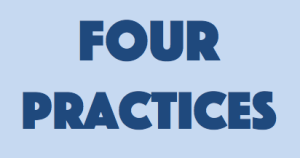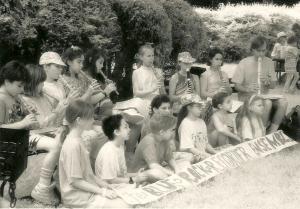Home » Pedagogy
Category Archives: Pedagogy
Herring’s Head
Herring’s Head is a cumulative folksong that I taught to and sung with students of all ages at many schools over the course of my teaching career. It features humorous lyrics that deliver a conservation message about whole animal or “nose to tail” eating (mindful consumption). Herring’s Head‘s call-and-response structure, extroverted attitude, and whimsy made it a popular and successful song to sing with large groups of children and adults.
How Great is the Pleasure
or, Love and Music

directing the Nashville School of the Arts Chamber Choir, May 13, 2013, Ingram Hall, Blair School of Music, Vanderbilt University, Nashville (click images to enlarge)
This lovely eighteenth century canon was a staple of my school choirs’ repertoires throughout my entire teaching career. I came across it in a songbook when I first started teaching at Blue Rock School in the early 1990s, and I believe I taught this to every choir I directed until I left teaching in 2014. I taught it to every age group: elementary, middle school, high school. Over the years, How Great is the Pleasure became a kind of unofficial choir theme song for my vocal ensembles, and although it was not something we often sang in performances (especially with older groups of children), we sang it on a regular basis, often as part of our warm up or to close a rehearsal. I never met a child who did not love to sing this song.
Off The Podium Published in Choral Director Magazine
 I’m thrilled to share here that my column Off The Podium made its first appearance this week in the October 2016 issue of Choral Director magazine. Off The Podium will be a regular component of Choral Director going forward, featuring the kinds of articles about music education I have been posting here on my blog since March 2015.
I’m thrilled to share here that my column Off The Podium made its first appearance this week in the October 2016 issue of Choral Director magazine. Off The Podium will be a regular component of Choral Director going forward, featuring the kinds of articles about music education I have been posting here on my blog since March 2015.
And as if this weren’t sweet enough: to launch my column with a splash, I am also featured on the cover!
The Count

Music City Youth Orchestra students warm up before a concert, May 22, 2011, Schermerhorn Symphony Center, Nashville
The Count is a concentration exercise – a group activity – that I used with my student ensembles in the last few minutes before going on stage for a performance. It is a very useful thing to do! and became something of a special ritual with my ensembles.
I didn’t invent The Count, although I had never heard it called by any name before my students began calling it this. I first encountered it in the early 1990s when I witnessed Ellen Provost, a teacher at Blue Rock School, use it with a group of 6th graders before the performance of a play – I believe it was either The Conference of the Birds or Monkey. I began using it myself at Carrollwood Day School years later, and it was at CDS that it became a regular practice – something I always did with my students before a performance, if possible, for the rest of my teaching career.
Four Practices
 When I read education articles or discussions of education practices on the internet, a theme that I constantly encounter is classroom management and discipline. Current trends in behavior modification theories and practices have promoted a widespread use of reward systems for social (as opposed to anti-social) behavior that is at odds with my own beliefs about education.
When I read education articles or discussions of education practices on the internet, a theme that I constantly encounter is classroom management and discipline. Current trends in behavior modification theories and practices have promoted a widespread use of reward systems for social (as opposed to anti-social) behavior that is at odds with my own beliefs about education.
In 1998, our four-year old son was enrolled in a preschool program, and we learned from him one afternoon that at his (church sponsored) preschool they were paying the children for good behavior in play money and on Fridays, allowing the children who had accumulated some “cash” to spend it on toys or candy from the “store”.
My wife and I were shocked at what I still regard as a deeply cynical approach to the education of young children, and withdrew our son from that program immediately.
Understanding Accelerando: FAQ
 Our very first auditions for Accelerando are around the corner: applications and all supporting materials are due by Friday, March 4, and auditions will be held at W.O. Smith Music School on Saturday, March 12.
Our very first auditions for Accelerando are around the corner: applications and all supporting materials are due by Friday, March 4, and auditions will be held at W.O. Smith Music School on Saturday, March 12.
For the last two months, our Education & Community Engagement Department here at the Nashville Symphony has held information sessions out in the community and fielded many questions by email and phone as we seek to find the right students to begin this groundbreaking program this year.
Accelerando is a unique music education initiative distinct in many ways from other music education programs in Middle Tennessee. In order to foster greater understanding of the goals of Accelerando, what the program entails, and who is eligible to participate, I have compiled here a list of some of the most frequently asked questions we have received about Accelerando – together with some responses.
How to Teach Recorder Fingerings
This post is especially for those teaching the recorder to children in school settings – but it might be worth a look if you are learning how to play the instrument as well.
I hope that this brief post will be helpful to those teaching recorder in elementary school who have little or no background with the instrument as players themselves. My impression is that most elementary school music teachers haven’t actually studied recorder for its own sake (e.g taken lessons, played in a consort or performed solo recitals on recorder, etc.). I thought about the topic of this post recently when I remembered that I have never encountered middle or high school students that had been taught recorder in elementary school (by someone other than me) who were familiar with this system.
Solfège With Amadeus
Go to Part 1: The Joy of Solfège
Go to Part 2: The Legacy of Guido d’Arezzo
Go to Part 3: Teaching Music With Solfège
This Epilogue to my series of posts on Solfège recounts examples of solfège exercises I used in high school choir rehearsals, some anecdotes about singing Mozart’s Requiem on solfège syllables, and some unexpected things we learned from doing this.





